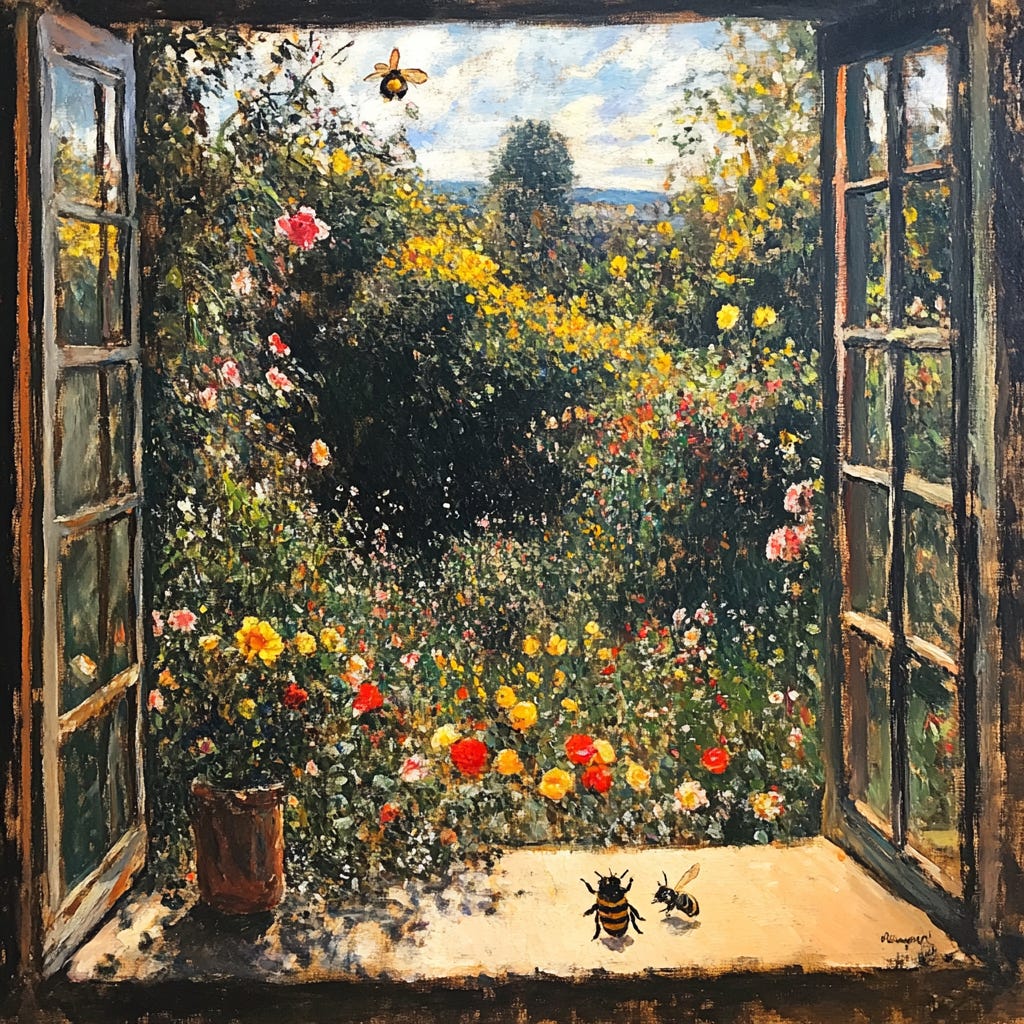Telling Air from Glass
"I am not the wise old fish. The point of the fish story is merely that the most obvious, important realities are often the ones that are hardest to see and talk about." David Foster Wallace
Returning to Germany is always a peculiar experience for me. The country, its people, and my family offer a mirror to observe what has changed and what has always been — and to see what I would rather avoid.
It also means saying goodbye to air conditioning. Instead, one gets up early to open the windows and lower the shades. Inevitably, animals find their way from the garden into the house.
I was working on a piece when I heard a bee buzzing. It made its way across the window, all the way to the top, left and right, before tumbling back down. It was exhausting to watch and the buzzing kept pulling my attention away from the laptop. So I got up and opened the window further.
“Can’t you see that it’s open,” I said. No, the bee could not. It kept crisscrossing the glass.
I watched it struggle mindlessly. If only it went a little further to the left. Stupid bee. What was I supposed to do, carry it to the garden?
If I had shrunk down to the bee’s size and asked it how things were going, how would it have responded?
“I’m tired. I can see all the flowers and I’m trying so hard to get back there. I am working nonstop, but some invisible force keeps me away.”
It must have seemed to the bee that the world was conspiring against it.
From my point of view, it was about an arm’s length away from destiny. If only it had stopped pushing against the glass that would never yield. If only it had shifted its attention from seeing the garden to sensing the flow of air carrying the scent of flowers.
Its only hope is luck or divine intervention — a friendly human trapping it in a glass and releasing it outside.
I often feel like that bee.
I can see the colorful garden. In myself and the people I meet, I can see the vast gap between what is and what could blossom. And yet it often feels like I am getting no closer, that invisible forces are preventing me from reaching that valley of infinite flowers.
What if the window was open? What if whoever opened it shakes their head at the silly humans bumping their heads against invisible walls? What do we expect — to be trapped in a cup and carried to the garden?
The invisible force keeping us from our potential is both real and not. It is no conspiracy, just us bumbling around and getting in our way. It’s the result of being out of tune, not in flow. But how do we find a better way?
How do we become, as David Foster Wallace put it in This is Water, “just a little less arrogant”? Wallace strained against “the total wrongness” of experiencing oneself as “the absolute centre of the universe.” But how? How do we gain perspective? How do we tell air from glass?
I’ve spent the past week around family — mom, dad, sister, aunt and uncle, my ailing grandparents. As much as I love them, there are moments when I would love, love, love to wave a magic wand and change their lives. Better yet, change them.
“Everything that irritates us about others can lead us to an understanding of ourselves,” Jung said and I believe this is most true for the people we love who contain aspects of ourselves. Where Wallace emphasized control over thinking and attention, I believe emotional reactions can offer us breadcrumbs to shift from thinking to feeling and to the observer’s perspective. Because it is painfully obvious to us when the people we love bump into the window. And the smudges they leave on the glass can help us find our way.
Triggers can be avoidance, refusal to let go, refusal to change or take action, missing low-hanging fruit, not using obvious talents and strengths, choosing short-term over long-term opportunities; also when people are harsh and critical about themselves. All of these trigger me because I carry them as well.
I did an exercise similar to John Sarno’s/Nicole Sachs’ Journalspeak, a practice I’ve started to experiment with. I picked one person and wrote down every emotional reaction. At first, it was a lot of “How is X still doing Y, this is driving me nuts.” I tried to focus on how it made me feel and why (the next level would be ‘where in my body do I feel this’).
Once it was all on the page, questions showed up. Were they ever going to change? Could they? What if they didn’t? Could I accept them regardless? Could I accept that they chose not to change? Could I release the feeling entirely? Is it possible that I don’t want to change this person but rather the same behavior in my own life?
Finally, I reviewed the list and replaced their name with mine. “How am I still doing this…” Can I accept them turned into can I accept myself?
People are like mirrors in that what we notice about them is a reflection of ourselves. They can be similar or opposite, but always they carry the potential to teach us more about the contour of who we are, more about what is glass and what is not.
I am about to leave for the Alps and it is time for the bee to leave the apartment. I trap it under the glass and a sheet of paper. A final moment of confusion and straining, and pushing against invisible forces. Once released, the bee resumes an easy, joyful flight.
The path to the garden is flow. If life feels like pushing against glass, look for ways to make it visible. Look for perspective. In my experience, nobody does it better than the people we love, whose buzzing and bumping we can recognize as our own.
Have a great weekend,
Frederik
And the so-called real world will not discourage you from operating on your default settings, because the so-called real world of men and money and power hums merrily along in a pool of fear and anger and frustration and craving and worship of self.
… The really important kind of freedom involves attention and awareness and discipline, and being able truly to care about other people and to sacrifice for them over and over in myriad petty, unsexy ways every day.
That is real freedom. That is being educated, and understanding how to think. The alternative is unconsciousness, the default setting, the rat race, the constant gnawing sense of having had, and lost, some infinite thing. — This is Water by David Foster Wallace






Wow... beautiful writing!
This is a most thought provoking, intriguing essay. You artwork and photograph are beautiful. This lovely, quiet, evocative piece is just what I need to refocus everything. I'm going to love following you ✌️